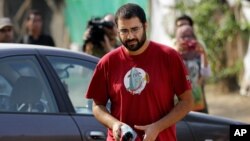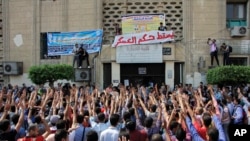An Egyptian judge ordered 21 democracy activists arrested on Monday at the start of their retrial for breaking a law against protests that was passed after the military last year ousted Egypt's first-democratically elected Prisident Mohamed Morsi.
The activists - including leading campaigner Alaa Abdel Fattah - chanted “down with military rule” and “down with the military judiciary” from their courtroom cage after the judge read out his decision.
Also on Monday, Egyptian President Abdel-Fattah el-Sissi said he is expanding the role of the military in an effort to curb a wave of terrorist attacks in Sinai.
The Egyptian leader, a former army general who toppled Morsi, on Monday ordered the military to join police forces for the next two years in guarding key state facilities, such as roads, railways and pipelines.
University students in Egypt have also been protesting the government restrictions and demanding the release of hundreds of their colleagues from jail.
Police backed by armored vehicles have stormed the campuses of at least two prominent Egyptian universities in Cairo and Alexandria two weeks ago to quell anti-government protests by students.
Sentenced earlier this year
In the court case, the defendants, plus four more who did not show up, had been sentenced to 15 years in absentia last June for violating a 2013 law curbing the right to public protests, which rights groups have denounced as repressive.
They were later arrested, which under Egyptian law meant they had to be tried again in person on the same charges. That trial collapsed on Sept. 15 when the presiding judge stepped down and all 25 were freed on bail, pending a new retrial.
The court also ordered the arrest of the four absent defendants on Monday.
Abdel Fattah is a well-known secular figure prominent in the 2011 revolt that forced former president Hosni Mubarak to step down after almost 30 years in power. Abdel Fattah has been in and out of jail since then, missing the birth of his child and the death of his father Ahmed Seif al-Islam, himself one of Egypt's best-known human rights activists.
The protest law tightly restricts the kind of demonstrations that ousted Mubarak and stoked a popular movement against Morsi.
It gave the interior ministry the power to ban any public gathering of more than 10 people and added to fears that freedoms won during the 2011 uprising were being rolled back.
Military court action
The detention of the defendants came as Egypt expands the jurisdiction of military courts to try civilians accused of attacking state facilities or blocking roads.
Two such attacks in the Sinai peninsula over the weekend killed at least 33 security personnel in one of the worst assaults on security forces since Morsi's ouster.
Suspected militants have carried out repeated attacks on gas pipelines, power lines and telephone exchanges, while also blocking Cairo traffic by throwing oil on key roads and bridges.
Sissi decreed that protesters attacking the facilities would be tried in military tribunals rather than civilian courts.
In the 15 months since Sissi assumed control of Egypt, authorities have killed hundreds of protesters and jailed thousands. But the government has also cracked down on dissent from secular, pro-democracy activists.
Egypt's secular activists have also found themselves on the wrong side of the new regime.
Three-year prison sentences
Also, on Sunday, an Egyptian court convicted 23 young pro-democracy activists of staging an illegal demonstration and sentenced them to three years in prison, even in the face of international calls for their release.
The activists were arrested in June allegedly for violating a law that bans all but police-sanctioned protests, The ban is seen as part of a continuing crackdown on dissent in Egypt by Sissi's government.
Defense lawyer Ahmed Ezat said the verdict was legally flawed.
"I believe that the sentence is politicized. It has no legal ground. We cannot simply hold a trial for 23 defendants who have different legal positions and different relationships to the actions they were attributed," Ezat said.
Some of the activists had supported the military's overthrow of Morsi. But they since have turned against the Sissi government with its severe restrictions on street protests.
In August, Seif, who brother is Alaa Abdel Fattah, announced that she was starting a hunger strike, according to The Hollywood Reporter.
A Cairo judge on Sunday also fined the activists about $1,400 apiece.
Among the defendants were Yara Sallam and Sanaa Seif, described by Amnesty International as "prisoners of conscience."
Some material for this report came from Reuters.


